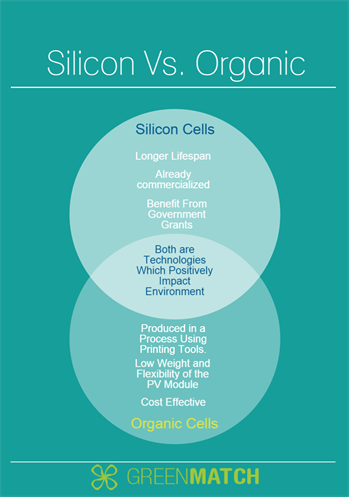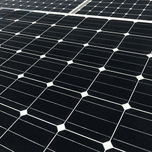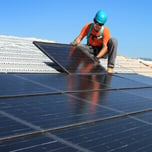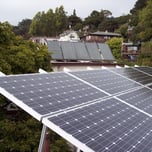Answer these simple questions and we will find you the BEST prices
Which type of solar quotes do you need?
It only takes 30 seconds
100% free with no obligation

Get up to 4 quotes by filling in only 1 quick form

Slash your energy bills by installing solar panels

For the average 2-3 bedroom house
- GreenMatch
- Solar Energy
- Solar Panels
- Photovoltaic Cells
- Organic Solar Cells
Organic Solar Cells - Compare Prices Here (October 2025)
What Are Organic Solar Cells?
Organic photovoltaic (OPV) cells are the third generation of solar cell technology. Organic cells are very strong absorbents of light, being able to harness larger amounts of sunlight than other solar cells. The future of solar technology is organic power. Even when traditional solar technologies meet their match, organic power continues to offer nearly limitless possibilities thanks to its extraordinary properties.
Organic photovoltaics (OPV) is a rapidly increasing new solar cell technology. Among its advantages can be included its lightweight nature, large area coverage and low-cost of manufacturing. OPV are thin-filmed solar cells with the possibility of storing larger amounts of solar energy than their predecessors. This new technology drives the solar energy industry forward, as new R&D makes it possible for increased sustainability.
An organic solar cell or plastic solar cell is a type of polymer solar cell that uses organic electronics, a branch of electronics that deals with conductive organic polymers or small organic molecules, for light absorption and charge transport to produce electricity from sunlight by the photovoltaic effect. Organic photovoltaic cells convert solar energy into electrical energy more efficiently than previous solar cells such as silicon cells found in most common solar panels.
If you are interested in the use of this technology for your home and would like more information, on for example prices, GreenMatch can assist you by providing you with free, non-binding quotes from different suppliers. Take 30 seconds to complete our solar form by clicking the button below.
- Quotes from local engineers
- Payment by finance available
- Save up to £1,567 per year
It only takes 30 seconds



Advantages of Organic Solar Cell
Organic solar cells have the ability to utilise larger areas than its inorganic counterparts. Containing flexible solar modules, organic cells can be fabricated using roll-to-roll production, a process that is less costly than the conventional manufacturing way. This flexibility property also allows for further durability over its counterparts.
The new breakthrough in solar cell technology means portable electronic devices could soon be re-charged on the move in low light levels and partial shading like solar panels. The result is an organic solar cell that generates a high voltage sufficient to recharge a lithium-ion battery directly, without the need to connect multiple individual cells in series.
Elements of these high voltage cells perform well in different light conditions, even if in areas with low levels of sunlight, which makes them ideal for consumer electronic devices. Solar technology has only been in the test phase, however, thanks to its high success rate the next step is to extend solar technology outside the laboratory to make cheap OPV chargers available on a commercial scale. Some advantages of organic solar cells are:
- Low weight and flexibility of the PV modules
- OPV has a semi-transparent characteristic
- Easy to integrate into other products
- New market opportunities, due to their design features such as flexible solar modules
- Lower manufacturing costs compared to conventional inorganic technologies such as silicon solar cells
- Organic photovoltaic cells can be produced in a continuous process using printing tools
- OPV’s have a low environmental impact and short energy payback times
Disadvantages of Organic Solar Cells
In order for organic solar cells to match and exceed the performance of silicon-based solar cells, it is necessary for both donor and acceptor materials in an OPV to have good extinction coefficients (referring to several different measures of the absorption of light in a medium), high stabilities and good film structure.
Although organic solar cells have a higher efficiency than their silicon-based counterparts, their operational lifetime is not as long. It is true that while these cells are still in the development phase, various new materials, processing methods and device architectures having been investigated to improve this feature, it is currently their key limitation.
Organic Solar Cell Price

In the present day, a small amount of power is generated worldwide by solar cells which convert energy from the sun into electricity, powering households and businesses.
Solar cell price is still too expensive for everyone to benefit from because of the great use of solar power in solar panels. The main material which composes most of the today’s solar cells is crystalline silicon, with an efficiency of most common solar panels of approximately 10 percent.
When taking into consideration the cost of solar panel in the UK, solar panels support, wiring, and DC to AC converters, the solar cell price becomes a costly matter. Adding to this, the lifespan of a solar panel is approximately 30 years, so a new solar installation would be required after.
Organic solar cells are the next step for solar energy, making this technology affordable for more people due to the solar cell price reduction of solar cells. Even though the organic solar cell technology is still new, the estimated cost of manufacturing for purely organic solar cells will range between £30 and £90/m2.
If you are interested in purchasing solar cells, we can help you find multiple local solar professionals who will provide you with up to 3 quotes. With GreenMatch's free quote service you no longer need to spend hours researching qualified solar installers. It's now as quick and easy as spending 30 seconds to fill in our contact form. This service is completely free of charge and non-binding!
- Quotes from local engineers
- Payment by finance available
- Save up to £1,567 per year
It only takes 30 seconds



We strive to connect our customers with the right product and supplier. Would you like to be part of GreenMatch?





